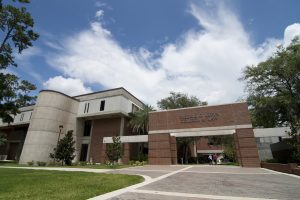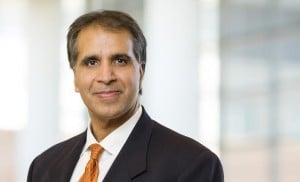Law School Deans
-

-
 Law Professors, Law Schools
Law Professors, Law SchoolsFirst Monday Musings: On Academic Freedom, Administrative Fairness, And Blackface
The intent of the professor who wore blackface as part of a Halloween costume matters, according to Dean Vikram Amar.  Sponsored
SponsoredThe Business Case For AI At Your Law Firm
ChatGPT ushers in the age of generative AI – even for law firms.-
 Law Schools, Supreme Court
Law Schools, Supreme CourtOops! This Supreme Court Justice Went To Law School For The 'Wrong Reasons'
It seems to have all worked out in the end for this justice.
-
 Morning Docket
Morning DocketMorning Docket: 10.19.16
* The LSAT may be “destroy[ing] socioeconomic diversity” in law schools. Will a low score on the Logic Games section of the LSAT keep you from becoming employed as a lawyer? Probably not, but it may keep you from attending a top law school, unless you can afford an expensive LSAT tutor, and many prospective law students are priced out from the get-go. [The Atlantic]
* Darby Dickerson, dean of Texas Tech Law, is resigning to assume the deanship at John Marshall Law-Chicago, a school whose enrollment has faltered over the past several years. She was asked during a job interview why she would leave a ranked law school for an unranked one, and her response may surprise you. [Crain’s Chicago Business]
* The first oral argument of the new SCOTUS term marked one of the first times that complete gender equality was reached at the high court. Five men — all justices — and five women — three of them justices and two of them representing their clients — were all present for Bravo-Fernandez, which is a relative rarity. [Washington Post]
* “I feel that as a result of the experiences I had, I had a lot to offer.” With the assistance of Dewey & LeBoeuf’s former GC, Hinshaw & Culbertson is launching a crisis management and consulting practice. The firm is now in competition with businesses like Zeughauser Group, Altman Weil, and Hildebrandt Consulting. [Big Law Business]
* A class-action suit has been filed over Samsung’s recall of its fiery smartphone, alleging breach of warranty, breach of good faith, and common law fraud. You can expect the size of the proposed nationwide class of plaintiffs in this suit (or at least those in California, Pennsylvania, and Nevada) to explode faster than the Galaxy Note 7. [WSJ Law Blog]
-
 Law School Deans, Law Schools
Law School Deans, Law SchoolsLessons Law School Deans Should Know...
If you want to be a dean (or an associate dean), here are some things you need to remember... -

-
 Law School Deans, Law Schools
Law School Deans, Law SchoolsDean Of Most Prestigious Law School In America To Step Down
Who will serve as the law school's new dean? -
 Morning Docket
Morning DocketMorning Docket: 10.13.16
* According to a new survey published by legal search firm Major Lindsey & Africa, on average, female Biglaw partners make 44 percent less than male Biglaw partners, and the pay disparity is largely due to who receives origination credit for business. We’ll have more on this study later today. [DealBook / New York Times]
* Uh-oh! This Australian law firm may be going even further down under… Following a restructuring and several rounds of layoffs, Slater & Gordon, the world’s first publicly traded law firm, has found itself on the receiving end of a class-action securities case on behalf of its shareholders over its continually tumbling share prices. [WSJ Law Blog]
* “Today’s ruling marks an end to Mr. Paxton’s almost year-long attempt to avoid being judged by a jury of his peers.” Even though a federal judge tossed out similar charges last week, Texas Attorney General Ken Paxton will face trial on state securities fraud charges. Paxton’s lawyers plan to appeal the ruling to a state appellate court. [Big Law Business]
* The last time your jeans were cool was when they were a lyric in “My Humps”: After falling out of fashion, True Religion has hired Kirkland & Ellis to explore some debt restructuring options. With about $500 million in debt to deal with, the company may have to file for bankruptcy or hope for kind negotiations with its lenders. [Reuters]
* “What is he thinking? Already his conduct is going to make him a pariah in many law school contexts — and this just fuels the flames.” Former Berkeley Law Dean Sujit Choudhry’s next court hearing for his racial discrimination case is on November 3. What is the law school’s latest argument against his claims? [San Francisco Chronicle]
* Jack Greenberg, former leader of NAACP Legal Defense Fund, RIP. [New York Times]
 Sponsored
SponsoredGenerative AI In Legal Work — What’s Fact And What’s Fiction?
Zach Warren from the Thomson Reuters Institute discusses the potential and the pitfalls.-
 Morning Docket
Morning DocketMorning Docket: 10.11.16
* As we previously mentioned, London-based firms CMS and Olswang and international firm Nabarro were considering entering into a merger. Partners at all three firms have officially voted in favor of the merger, which will close in May 2017. The new firm will operate under the CMS name. We’ll have more on this later. [Legal Week]
* “The infringement has been affirmed, now it’s whether this huge judgment should be affirmed.” In the Supreme Court’s first design patent case in more than 120 years, Samsung will face off against Apple today, where the smartphone companies will duke it out over how much Samsung should have had to pay for copying the iPhone. [Reuters]
* “Justice [Ruth Bader] Ginsburg no longer needs to worry about whether she seems threatening to the Court. She is the Court.” A new linguistics research study tells us what we can learn from Justice Ginsburg’s accent as a lawyer versus her accent as a Supreme Court justice, and how all lawyers make accommodations in their speech. [TIME]
* By edict of a federal court — and over Governor Rick Scott’s objections — Florida’s voter registration deadline has been extended to 5 p.m. Wednesday thanks to Hurricane Matthew’s interference with last-minute sign-ups. Florida’s Democratic Party alleged many voters would be “severely burdened” by the hurricane’s effects. [CNN]
* Sorry, social justice warriors: Harvard Law 1Ls wanted to feed the university’s striking dining services workers at their sections’ social committee events, but Dean Marcia Sells shut down their plans, saying it “does not seem to make sense for us to encourage … students to bring in food to feed workers who are on strike.” [The Concourse / Deadspin]
-
 Law School Deans, SCOTUS, Supreme Court
Law School Deans, SCOTUS, Supreme CourtFirst Monday Musings By Dean Vik Amar: The Supreme Court Going Forward
How much does the Supreme Court matter in the big picture? -
 Morning Docket
Morning DocketMorning Docket: 09.26.16
* As you may have already seen, Republican presidential candidate Donald Trump released another list of his potential Supreme Court nominees ahead of tonight’s debate. The list includes a Republican senator who has refused to endorse Trump (and has already turned down Trump’s proposal), three non-white judges, and one female judge. [WSJ Washington Wire]
* Speaking of the Supreme Court, the justices may be shorthanded and trying to avoid 4-4 deadlocks on controversial cases, but they’ll soon decide whether they’ll liven up this term’s docket by agreeing to hear a major transgender rights case involving public school bathrooms. It could be one of the biggest case of the high court’s 2016-17 term. [Reuters]
* “[Twelve] students is not any kind of representation of our program.” Indiana Tech Law’s dean says the fact that only one of the school’s graduates passed the bar isn’t a realistic assessment of the quality of their education, and was unwilling to confirm the school’s low pass rate since five graduates were appealing their results. [Indiana Lawyer]
* The Department of Education will not suspend the American Bar Association from accrediting new law schools, despite a recommendation to do so from the National Advisory Committee on Institutional Quality and Integrity. We’d like to think that the ABA has learned its lesson, but perhaps that’s a bit naive of us. [ABA Journal]
* In anticipation of further fallout from its fake accounts scandal, Wells Fargo has hired Shearman & Sterling to advise the bank’s board as to the legal ramifications of a possible clawback of pay from Chief Executive Officer John Stumpf, Chief Operating Officer Tim Sloan, and Carrie Tolstedt, the former head of community banking. [Bloomberg]
-
 Bar Exams, Law Schools
Bar Exams, Law SchoolsA Terrible Excuse For Terrible Bar Exam Results
It's good to know someone in academia is willing to point out the obvious. -
 Morning Docket
Morning DocketMorning Docket: 09.16.16
* Former Berkeley Law dean Sujit Choudhry is suing the school, claiming that Berkeley discriminated against him by punishing him more harshly for alleged sexual harassment compared to white professors. [Law.com]
* The family of Sandra Bland settles its lawsuit over her death for $1.9 million. [New York Times]
* The Sixth Circuit, sitting en banc (and rather splintered), rules that the mental-health ban on gun ownership could violate the Second Amendment. [How Appealing]
* Congratulations to Miami corporate partner Ira Coleman, who will replace Peter John Sacripanti and Jeffrey E. Stone as chair of McDermott Will & Emery in January. [Big Law Business]
* Ashurst remains in a tailspin, with five partners (including two office heads) leaving in the span of 24 hours. [Ashurst]
* In other U.K. law firm news, Freshfields is replacing “Dear Sirs” with gender-neutral salutations in all communications and legal documents. [The Lawyer via Big Law Business]
* More exciting news for Bancroft: recognition for its pro bono work, which partners pledge will continue after they move over to Kirkland. [Law360]
* Paging parents who left Davis Polk to raise their kids: here’s a program to bring you back into Biglaw. [Law.com via ABA Journal]
Sponsored

Legal AI: 3 Steps Law Firms Should Take Now

Generative AI In Legal Work — What’s Fact And What’s Fiction?


Is The Future Of Law Distributed? Lessons From The Tech Adoption Curve
Sponsored

Navigating Financial Success by Avoiding Common Pitfalls and Maximizing Firm Performance

The Business Case For AI At Your Law Firm

-
 Law School Deans, Law Schools
Law School Deans, Law SchoolsDeans: How To Avoid Sinking Your Ship
If people see you as acting rationally and strategically, your life will be much easier as dean. -
 Morning Docket
Morning DocketMorning Docket: 09.13.16
* Green Party presidential nominee Dr. Jill Stein will appear at Vermont Law School today, where she’ll meet with members of the law school community to speak about her plan to transition the country using 100 percent renewable energy. Law students will be especially excited to hear about her plans to cancel all student loan debt. [VTDigger]
* “Talk to your classmates, especially those with different views. Even if you come away from it disagreeing even more, at least you know what makes them tick, which is a useful thing.” Last week, Justice Elena Kagan went back to Harvard Law, the school where she once served as dean, to share helpful tips with law students. [Harvard Crimson]
* Federal prosecutors may have dropped their corruption case against ex-Gov. Bob McDonnell after SCOTUS threw out his convictions, but now he’s got some pretty hefty legal bills to pay to Jones Day and Holland & Knight. Right now, he owes more than $10M to the partners who helped clear his name. [Richmond Times-Dispatch]
* A lot of big-time lateral moves were announced yesterday, including Kirkland & Ellis’s mass hiring of all Bancroft lawyers, but Gibson Dunn’s news may top all the rest we’ve yet to cover. Stuart Delery, the former acting associate attorney general of the Justice Department, will join the firm as a partner in Washington, D.C. [Big Law Business]
* Ex-Canadian prime minister Stephen Harper has found a new home — or rather, a “strategic affiliation” — with a global Biglaw firm. He’ll be working out of the Calgary office of Dentons, where he’ll work with many former colleagues and advise firm clients on market access, managing global geopolitical, and economic risk. [Huffington Post]
-
 Law Reviews, Law Schools
Law Reviews, Law SchoolsThe Most Valuable Lesson Of The Florida Dean Controversy
Even the lower-tier schools have their moments. -
 Morning Docket
Morning DocketMorning Docket: 09.09.16
* “In the past, law school was often times seen as a safe haven in a bad market, and that’s just not the case given the jobs that are available.” Applications may be down, but given the state of the job market, more and more students are flocking to law schools without any desire to practice law, intending to pursue alternative career paths instead. [Wisconsin Bar]
* Former Berkeley Law Dean Sujit Choudhry returned to campus this semester after resigning from his post thanks to a sexual harassment lawsuit, but a letter he penned on the subject that was published in the school paper didn’t have the results he expected; instead, about 100 law students protested the professor’s presence on campus. [SFGate]
* The House of Representatives is scheduled to vote on the Investment Advisers Modernization Act of 2016 today, a bill that private equity firms hope will chip away at Dodd-Frank’s requirements on what information the industry must report to regulators. The White House has threatened a veto if it’s passed. [DealBook / New York Times]
* Can this group of general counsels from Fortune 100 companies save the legal profession from becoming a haven for old white men and turn it into a melting pot of opportunity across all demographics? That’s what they’re hoping to do by hiring and firing outside counsel based on their diversity. Best of luck! [Big Law Business]
* Subway’s “footlong” class-action suit is now before the Seventh Circuit, with Ted Frank of the Competitive Enterprise Institute arguing that the lawyers who settled the sandwich-size discrepancy gave themselves too much credit, calling them, along with the class representatives, “the only beneficiaries of the case.” Ouch. [WSJ Law Blog]
-
 Law Schools
Law SchoolsThere's A Lot More To This 'Dean Calling Out A Student For Sexism' Story
Sexism allegations are only one piece of the puzzle. -
 Law School Deans, Law Schools
Law School Deans, Law SchoolsHow Law Deans Spend Their (Or, At Least, How One Dean Spent His) 'Summer Vacation'
There's a lot to keep law school deans busy over the summer. -
 Law Reviews, Law Schools
Law Reviews, Law SchoolsLaw School Dean Publicly Criticizes Student In Law Review Article Over A Sexist Remark
She publicly embarrassed a student, and she wasn't entirely wrong.